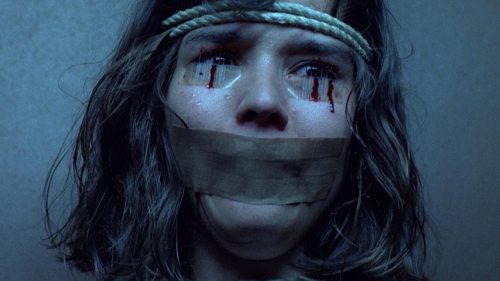MUBI Movies: BELLADONNA OF SADNESS (1973)
MUBI is a streaming service catering to cinephiles who believe in quality over quantity. Each day, MUBI adds a new film to its library, where it will stay for 30 days, after which it circulates out and gives room for another new entry. Throughout 2019, we will highlight one MUBI movie per month to help illustrate the catalog’s breadth and importance.
If the name Eiichi Yamamoto means anything to you, it’s likely for his work as a renowned writer and director of anime in the 1960s, including Astro Boy and Kimba the Lion. His work was formative to the evolution of the art form, but perhaps less well-known is his experimental work, the kind of stuff that challenged the child-friendly sensibilities of his more famous projects. Belladonna of Sadness is a 1973 feature film directed by Yamamoto, and in its time it was a commercial failure, likely due to the film’s vast departure from action spectacle into avant-garde symbolism and aggressively adult subject matter, but it deserves a second look as something of an underappreciated classic, a landmark in animation and a bold statement on sexual autonomy and liberation.
Set in medieval France, Belladonna of Sadness at first appears to be a retrograde tale of stolen sexual purity, as peasant couple Jean and Jeanne are unable to pay their lord’s outrageous taxes, so Jeanne is held captive and raped in lieu of payment. As Jeanne returns to her lover’s arms, she begins to recognize that they may not survive the winter with the limited amount of food at their disposal. Wishing for the power to survive, she inadvertently summons a phallic-shaped demon, who promises to grant her power in exchange for her immortal soul. Though Jeanne is at first resistant to so high a price, the demon grants her power anyway, sexually pleasing her so that she is able to fully embrace her femininity and use that to her advantage as a tradeswoman.
Despite its disturbingly graphic and arguably exploitative opening, Belladonna of Sadness unfolds into a tale of empowerment, demonstrating a link between what villagers and nobility consider demonic possession and the ability to use sexuality as a tool of charisma and manipulation. This leads to further punishment for Jeanne’s unwillingness to be modest in her attractive advantage through self-esteem, and this in turn only drives her further into the arms of the Devil, a figure who is only demonstrably evil as opposition to the government establishment that exploits the poor yet claims God on their side. Through Satan's influence, Jeanne becomes almost Christ-like in her ascension to sexual deity, spreading the gospel of hedonistic pleasure that opens the eyes of oppressed women and men as they start to question the absolute good that those in power claim as their own.
This is animated in a striking, relatively minimalist style, with characters often existing against blank backgrounds, immobile as voice acting carries most of the dramatic weight. This is largely due to a limited budget, but the film saves its moments of fluid animation for expressions of sexual extremity, whether it be the violent rape that opens the film or the bacchanalian orgy that represents the height of Jeanne’s rise to power. Sparsely colored with splashes of watercolor paint, there are few films that make so much of so little as does Belladonna of Sadness’ animation, and it lends the film an otherworldly, innately symbolic quality that compliments the representative depths of its subject matter.
Belladonna of Sadness is ultimately a tragedy, but it’s one informed by feminine empowerment in a setting where the simple embrace of nudity was considered evidence of Satan’s influence. But instead of rejecting that accusation of evil, Yamamoto embraces it, weaving a tale of witchcraft that shows that evil is relative only to those who wield the power to oppress, and that sexual liberation is a key to breaking the shackles of willing subjugation to authority. Embrace Satan and his psychedelic pleasures, and perhaps then and only then will women be able to rise against the tyranny of institutions that use patriarchy and religion as the tools of oppression.



